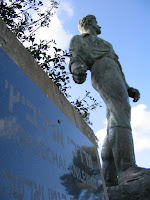AN UNRECOGNISED HERO
In the central building in Marnevski
square in Warsaw, where tens of Jews were barricaded, the Zionist flag was raised.
[It eventually became the national flag of Israel]. A heroic battle took part against the Nazi troops who had burst into the ghetto, and in which over 60
Jewish fighters were completely wiped out.
The 1943 Warsaw Ghetto
Uprising was the largest and most heroic act of armed resistance taken up by
the Jews during WWII. It was also the first civic uprising in the whole of occupied
Europe - apart from being one of the most significant occurrences in the
history of the Jewish people.
Ask any Israeli who was the leader
and hero of the Warsaw Uprising and he/she will invariably reply, “Mordechai
Anilewicz”. One of the biggest kibbutzim in Israel, Yad Mordechai, complete
with a gigantic bronze statue of Mordechai Anilewicz, was founded in his
name.
Another Jewish fighting
unit, which carried out no less, and maybe more, of the fighting, was a group
of Revisionists under the leadership of Pavel Frenkel. Before the
battles even started, Frenkel suggested that the two opposing political groups
fight together against the Nazis. However they were rejected by Anilewicz’s
people because of their political ideology.
Their political identity as
fighters of Ze’ev Jabotinsky, the leader of the right-wing Zionist movement and
founder of Betar, meant that Israeli public affairs preferred to intentionally
disregard the fighters in Marnevski Square.
It was only sixty-nine years after he died in
the Warsaw Ghetto uprising, that a plaque was dedicated to the Jewish fighter Pavel
Frenkel in a ceremony held in the city where he died.
The ceremony was attended by the former Education Minister, Gideon Sa’ar, former defense minister Moshe Arens z”l, a native of Poland, as well as the Warsaw Mayor and the Polish deputy Education Minister.
“This represents the mending of the
historical tragedy of Pavel Frankel and his brothers-in- arms in the
Jewish army, who fell in battle and whose story has not been told for many
years, and did not receive the proper recognition they deserve for their part
in the Warsaw Ghetto uprising,” said Sa’ar.
When Professor Moshe Arens was asked why the
Betar movement did not fight to bring the story of Pavel Frenkel to
light, he replied that the party was too weak and powerless against the elitist
party which controlled the state - and had played a significant part in
silencing the story.
Favel Frenkel,
who spoke to his friends before going to his death said: “Perhaps we will die,
but so long as Jewish history exists, our story will be told”. What he never dreamt
was that, whoever wrote the Jewish history, would totally disregard the story
of their heroism.



Comments
Post a Comment